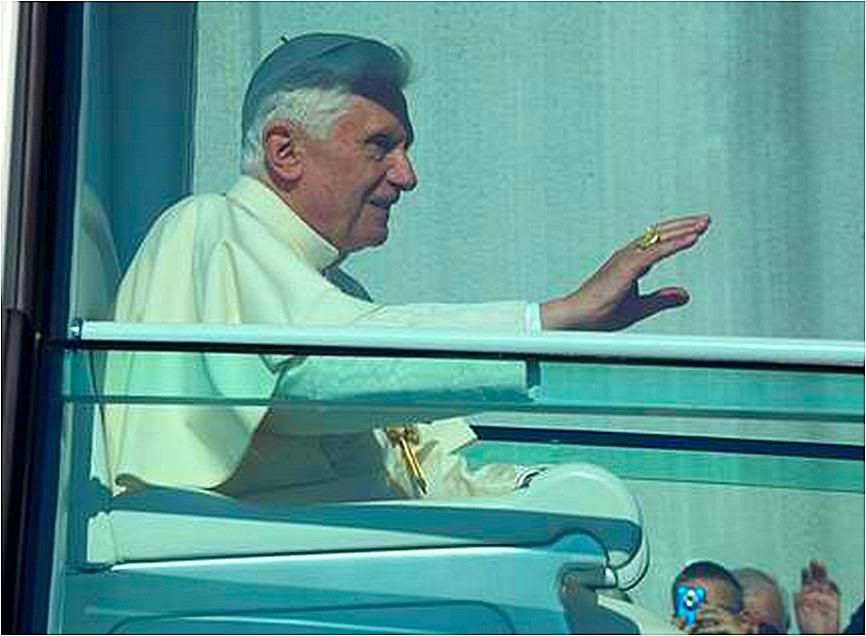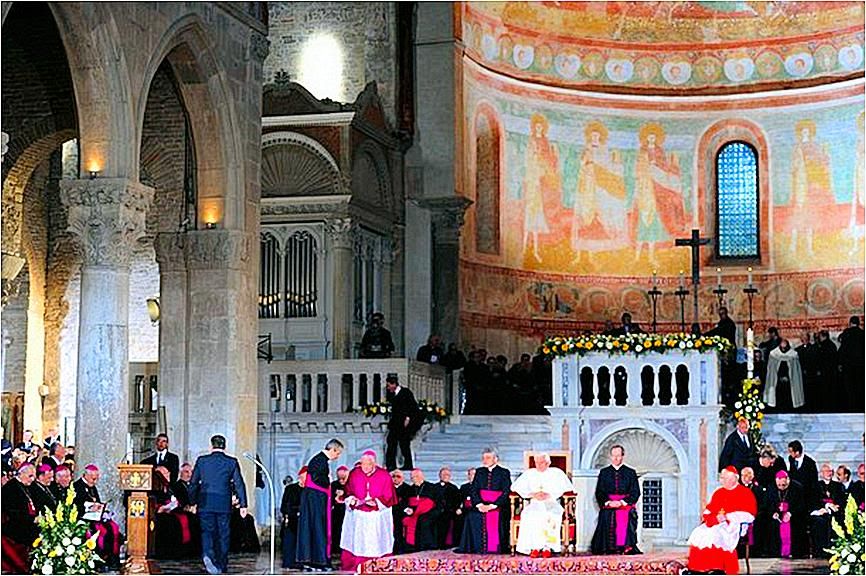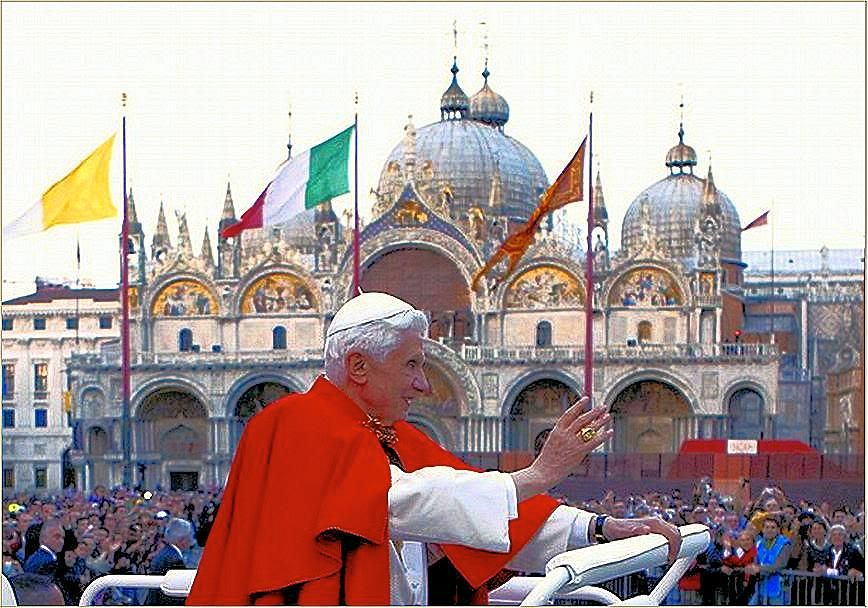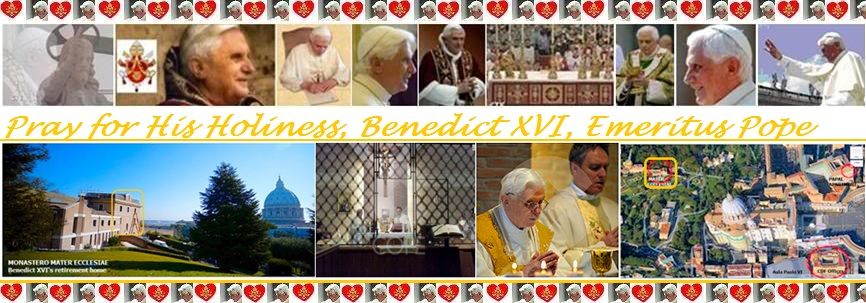| | | OFFLINE | | Post: 26.673
Post: 9.159 | Registrato il: 28/08/2005
Registrato il: 20/01/2009 | Administratore | Utente Master | |
|

 Tuesday, May 7, 2013, Sixth Week of Easter
Tuesday, May 7, 2013, Sixth Week of Easter
 Second from right: Canonization rites for St. Rosa and four others in October 2006.
ST. ROSA VENERINI (b Viterbo 1656, d Rome 1728), Virgin, Founder of the Maestre Pie Venerini
Second from right: Canonization rites for St. Rosa and four others in October 2006.
ST. ROSA VENERINI (b Viterbo 1656, d Rome 1728), Virgin, Founder of the Maestre Pie Venerini
Viterbo's second Santa Rosa was born more than four centuries after the first one, the mystic who died at age 17. Rosa Venerini always wanted to be a nun and did enter
a Dominican convent at age 20, but the death of her well-to-do physician father forced her to go back home to take care of her ailing mother and two siblings.
With a sodality of friends who gathered in her house daily to pray the rosary, she was inspired to start a free school for poor girls in 1685. It was so successful that
the Bishop of nearby Montefalcone asked her to start one in his diocese. From there on, she went to other places in Italy to start other schools. In Rome, it took
her a few years to get going, but Pope Clement XI had heard of her good works, and one day, visited while she was giving a class. She eventually died in the Rome house
of what would be recognized after her death as the order of the Maestre Pie Venerini (Pious Teachers of Venerini). At the time of her death, there were 40 Venerini schools
in Italy. The order was very active in the United States during the great waves of Italian immigration in the 19th century, and today, it has missions in Africa and Asia.
Mother Rosa was beatified in 1952 and canonized by Benedict XVI in October 2006.
Readings for today's Mass:
www.usccb.org/bible/readings/050713.cfm
AT THE VATICAN TODAY
No events announced for Pope Francis today.
The Vatican released the program of the Pope's visit to Rio de Janeiro on July 22-29 for WYD 2013.
He will also make a trip the shrine of Our Lady of Aparecida on the first full day of activities on July 24,
the day before he formally joins the WYD activities. He will have a full day's rest on July 23 at the residence
where he will be staying in Rio before the trip to Aparecida.
commencing his activities.
The Vatican released the statement (posted earlier on this page)seeking to straighten out a complaint
made Sunday before an international conference of women religious in Rome by the Prefect of the congregation
supervising religious orders.
 One year ago...
One year ago...
Benedict XVI continued his series of meetings with US bishops on ad-limina visit, meeting with eight bishops from southeastern USA (Region XVI). He later met with newly-inducted Pontifical Swiss Guards, with their family members.
On this day in 2011, Benedict XVI began a two-day pastoral visit to Aquileia and Venice in northeast Italy.

Hthe Holy Father's address to the faithful at Aquileia's Piazza Capitolo upon his arrival underscores the historical and religious importance of the Church of Aquileia:
Dear brothers and sisters,
It is with great joy that I come to you, children and heirs of the illustrious Church of Aquileia, from where I start my visit to the Churches of these lands.
To all of you - pastors, civilian authorities, faithful of the dioceses of the Triveneto region, as well as those from Slovenia, Croatia, Austria and Bavaria - I address my heartfelt greeting.
The archeological remains and the wondrous artistic vestiges for which Aquileia is well-known invite me now to gP back to the origins of this city which first arose in 181 and prospered in succeeding centuries, as the poet-bishop Paulinus sang: "..beautiful, illustrious, splendid, with its palaces, famous for its walls, and even more, for the countless crowds of your citizens,.. All the cities of Venetia were subject to you and made you their capital and metropolis, flourishing with your clergy, splendid for your churches dedicated to Christ" (Poetae Latini aevi Carolini, in M.H.H., 1881, p. 142).
Aquileia was born and developed at the peak of the Roman Empire, the doorway between East and West, a place of presidium and of economic and cultural interchanges.
But Aquileia had a different glory. In fact, as St. Paul tells us, God did not choose the noble and the powerful but that which was, for the world, was 'week and foolish' (cfr 1 Cor 1,27-28).
In the far-off province of Syria-Palestine, at the time of Augustus Caesar, there emerged he who came to bring light back to men with the Truth - Jesus, son of Mary and Joseph, eternal Son consubstantial with the Father, who revealed the never-ending imperium of God over men, his design of communion with all peoples - he who with his death on the Cross at the hands of the Empire, would establish the true kingdom of justice, love and peace, giving men who welcomed him 'the power to become children of God' (Jn 1,12).
From Jerusalem, through the Church of Alexandria, the Good News of salvation by Christ reached here. To this Roman region came the seed of the great hope. The Church of Aquileia soon became, in the tenth kingdom of the Empire, a community of martyrs, of heroic witnesses to the faith in the Risen One, seed for other disciples and other communities.
The greatness of Aquileia was not just that it was the ninth most important city of the Empire and the fourth in Italy, but that it was a living Church, exemplary, capable of authentic evangelical proclamation that was courageously spread to surrounding regions, and for centuries, conserved and nourished.
That is why I pay homage to this blessed land, irrigated by the blood and sacrifice of so many witnesses for Christ, and I pray to its holy Aquileian martyrs to continue inspiring today disciples of Christ who are courageous and faithful, devoted to him only and therefore, convinced and convincing.
The freedom of worship which was granted in the fourth century to Christianity further extended the radius of activity for the Church in Aquileia, widening beyond the natural confines of the Veneto and Bistria towards Retia, Norico, the broad regions of the Danube, to Pannonia and Savia.
Thus was formed the ecclesiastical metropolitan province of Aquileia, to whom bishops of churches that were distant rendered their obedience, accepted her profession of faith, bound themselves with the indissoluble ties of communion that was ecclesial, liturgical, disciplinary and even architectonic.
Aquileia was the beating heart of the region, under the wise and intrepid leadership of holy Pastors who defended her against the spread of Arianism. Among them all, I remember best Cromatius, about whom I spoke in my catechesis on December 5, 2007 - a bishop who was just as solicitous and hard-working as Augustine was in Hippo, and Ambrose in Milan, "the holiest and most educated of bishops", as St, Jerome described him.
The Church that Cromatius loved and served was great because of its profession of faith in Jesus Christ, true God and true man. Commenting on the story of the woman who first anointed the feet and then the head of Jesus with precious perfume, he said: "The feet of Christ indicate teh mystery of his incarnation through which he deigned to be born of a woman. His head, on the other hand, indicates the glory of his divinity proceeding from the Father before all time... This means that we must believe two things about Christ: that he is God and that he is man. God generated from the Father, man born of a virgin. We cannot otherwise be saved if we do not believe these two things about Christ" (CROMAZIO DI AQUILEIA, Catechesi al popolo, Città Nuova, 1989, p. 93).
Dear brothers, children and heirs of the glorious Church of Aquileia, I am among you today to admire this rich and ancient tradition, but above all, to confirm you in the profound faith of your Fathers: At this time in history, rediscover, defend and profess with spiritual ardor this fundamental truth - Only from Christ can mankind receive hope and a future; only from him can we draw the meaning and the strength of forgiveness, of justice, of peace. Keep always alive, with courage, the faith and the work of your origins.
Be, in your churches and in the womb of society, "almost like a blessed chorus'. as St. Jerome said of the clergy of Aquileia, through your unity in faith, your study of the Word, brotherly love, and your joyous and pluriform harmony of ecclesial witness.
I invite you to make yourselves ever anew disciples of the Gospel in order to translate it to spiritual fervor, clarity of faith, sincere charity, and ready sensitivity to the poor. You should shape your lives according to the sermo rusticus that St. Jerome spoke of in referring to the evangelical quality of the Aquileian community.
Be assiduous at the 'manger', as Cromatius called it, namely, the altar, where the nourishment is Christ himself, Bread of life, strength against persecutions, nourishment that revives in any weakness or uncertainty, food for courage and Christian ardor.
May the memory of the Holy Mother Church of Aquileia sustain and urge you on to new missionary goals during this troubled historical time, and make you artisans of unity and understanding among the peoples of your lands.
May the Virgin Mary always protect you on your journey, as I accompany you with my blessing.


Later, In the historic basilica of Aquileia, Benedict XVI addressed the bishops of the region:
Cardinal Patriarch Scola,
Venerated brothers in the Episcopate and Priesthood,
Dear brothers and sinners:
In the magnificent setting of this historic basilica which solemnly welcomes us, I address my most heartfelt greeting to all of you who represent the 15 dioceses of the Triveneto region.
I am very happy to meet with you as you prepare to celebrate next year the second ecclesial conference of Aquileia.
I affectionately greet the Cardinal Patriarch of Venice and our brothers in the Episcopate, especially the Archbishop of Gorizia whom I thank for his words of welcome, and the Archbishop of Padua, who gave us an overview of the preparations for the conference. I greet with the same affection the priests, religious and lay faithful present.
With the Apostle John, I wish to say to you: "Grace to you and peace from him who is and who was and who is to come" (Rev 1,4).
In 'synodal assembly', the Holy Spirit speaks to your beloved churches and to all of you individually, sustaining you for more mature growth in communion and reciprocal collaboration.
This 'ecclesial coexistence' allows all the Christian communities whom you represent to share, above, all the original experience of Christianity - the personal encounter with Jesus, which fully reveals to each man and woman the significance and direction of our journey in life and in history.
You have opportunely wanted your ecclesial assembly to take place in the Mother Church of Aquileia, which germinated the Churches of the Italian Norhteast, but also the Churches of Slovenia and Austria, and some Churches in Croatia, Bavaria, and even Hungary.
To reunite in Aquileia therefore constitutes a significant return to the 'roots' in order to rediscover the 'living stones' of the spiritual edifice which has its foundation in Christ and its prolongation in the most eloquent witnesses of the Church of Aquileia: the saints Ermagora and Fortunatus, Hilarius and Tacianus, Chrysogonus, Valerian and Cromatius.
Returning to Aquileia means, above all, to learn from the glorious Church that generated your Churches, how to ckmmit yourselves today, in a world that has changed radically, to a new evangelization of your territory and to hand on to future generations the precious legacy of the Christian faith.
"Whoever has ears ought to hear what the Spirit says to the churches" (Rev 2,7). Your pastors have repeated this invitation to all your local Churches and to various ecclesial realities. You have asked them to discover and 'narrate' that which the Holy Spirit has worked and continues to work on your communities; to reaD with tHe eyes of faith the profoumd transformations under way, the new challenges, the emerging questions.
How to announce Jesus Christ, how to communicate the Gospel, and how to educate our people in the faith today! You have chosen to prepare yourselves, in a detailed manner, diocese by diocese, for the conference of 2012 in order to enable you to face challenges that go beyond the confines of your individual dioceses, for a new evangelization rooted in the faith of centuries and renewed with vigor.
The presence today in this splendid basilica of the dioceses that were born from Aquileia seems to indicate the mission of the Northeast in the future, which also includes surrounding territories and those who, for various reasons, are in contact with them.
Northeast Italy is witness and heir to a proud story of faith, culture and art, whose signs are still very visible even in today's secularized society. The Christian experience has forged a people who are affable, hardworking, tenacious, and fraternally solid. They are marked profoundly by the Gospel of Christ, even in the plurality of their cultural identities.
This is demonstrated by the vitality of your parochial communities, the activity of the various associations, and the responsible commitment of your pastoral workers. The horizon of faith and Christian motivations which have given and continue to offer a new impetus to social life inspire good intentions and guide your practices.
Evident signs of this are the openness to the transcendent dimension of life, despite widespread materialism; a basic sense of religion which is shared by almost the entire population; attachment to the religious tradition; the renewal of courses of Christian instruction; multiple expressions of faith, charity and culture; manifestations of popular religiosity; the sense of solidarity and of volunteerism. Guard, strengthen and live this precious heritage. Hold on jealously to what has made these lands great and continue to make them great.
The priority mission that the Lord entrusts to you today, renewed by personal encounter with him, is to bear witness to God's love for man. You are called to do this, first of all, with works of love and decisions made in favor of the weak, the frail, the defenseless, those who are not self-sufficient, like the poor, the aged, the sick and the disabled - those whom St. Paul calls the weakest parts of the ecclesial body} [C}(1 Cor 15-27).
The ideas and realizations in the approach to longevity - a precious resource for human relations - are a beautiful and innovative testimonial of evangelical charity projected onto the social dimension.
Be careful to place the family in the center of your attention - as the cradle of love and life, the fundamental cell of society and the ecclesial community. This pastoral commitment is more urgent today in the increasingly more widespread crisis of conjugal life and the decline in the birth rate.
In all your pastoral actions, be sure to reserve special care for young people, who today face the future with great uncertainty. They often live in a condition of unease, insecurity and fragility, but in their hearts, they carry a great hunger and thirst for God that requires constant attention and response.
In your own context, the Christian faith today faces new challenges: the often exacerbated search for economic wellbeing during a time of grave economic and financial crisis; the practice of materialism; the dominant subjectivity.
In the complexity of such situations, you are called to promote the Christian sense of life, through the explicit announcement of the Gospel, that must be carried with pride and with profound joy
into the various aspects of daily life.
Faith lived with courage brings forth, today as in the past, a fruitful culture made up of love for life from conception to its natural end; promoting human dignity; exalting the importance of family, based on faithful matrimony and open to life; and a commitment to justice and solidarity.
The cultural changes underway call on you to be staunch Christians, "ready to give an explanation to anyone who asks you for a reason for your hope" (1Pt 3,15), able to face the new cultural challenges, in respectful confrontation that is constructive and aware with all those who live in this society.
The geographical location of the Northeast, which is no longer just a crossroads for East and West in Europe, but also between the North and South of the Adriatic, brings the Mediterranean to the heart of Europe, with the massive phenomena of tourism and of immigration, territorial mobility, a homologizing process brought on by the pervasive action of the mass media - all of which have accentuated cultural and religious pluralism.
In this context, which is what Providence gives us, it is necessary that Christians, sustained by 'reliable hope', propose the beauty of the coming of Jesus Christ - Way, Truth and Life - to every man and woman, in a frank and sincere relationship with non-practising Christians, with non-believers, and with believers in other religions.
You are called to live with an attitude full of faith as described in the letter to Diognetus: Do not reject anything in the Gospel in which you believe, but conduct yourselves among other men with sympathy, communicating through your own lifestyle that humanism rooted in Christianity, aimed at constructing together with all men of good will a 'city' that is more human, more just and more mutually supportive.
As attested by the long tradition of Catholicism in these regions, continue to bear vigorous witness to God's love, through the promotion of the 'common good' - the good of everyone and of each one. Your ecclesial communities have a positive relationship in general with civilian society and its various institutions. Continue to offer your contribution to humanize the spaces of civilian coexistence.
Lastly, I recommend to you, as to other Churches in Italy, a commitment to inspire a new generation of men and women capable of taking direct responsibilities in the various sectors of society, particularly in politics.
The field of politics more than ever needs persons, especially younger ones, who are able to build a 'good life' in behalf of and in service to everyone. Indeed, this responsibility cannot be avoided by Christians, who are pilgrims towards heaven but already live down here an anticipation of eternity.
Dear brothers and sisters, I thank God that he has allowed me to share this very significant moment with you. I entrust you to the Blessed Virgin Mary, Mother of the Church, and to your patron saints,
With great affection, I impart the Apostolic Blessing to all of you those who are dear to you. Thank you for your attention.
In the afternoon, the Holy Father proceeded to Venice where he stayed overnight and was welcomed by the faithful at St. Mark's Square.
 Iconic picture of Benedict XVI in front of St. Mark's Cathedral in Venice (taken at dusk so adjusted to appear brighter).
Iconic picture of Benedict XVI in front of St. Mark's Cathedral in Venice (taken at dusk so adjusted to appear brighter).


[Modificato da TERESA BENEDETTA 07/05/2013 18:47] |